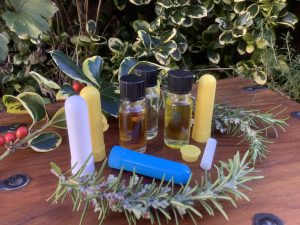- info@aromantique.co.uk
- 07419 777 451

Heather Dawn: Godfrey. P.G.C.E., B.Sc. (Joint Hon)
Author of Essential Oils to Ease Anxiety, Healing with Essential Oils, Essential Oils for the Whole Body, and Essential Oils for Mindfulness and Meditation, published by Healing Arts Press, Inner Traditions USA.
We are surrounded by viruses and other microbes with which we share a symbiotic and, mostly, healthy and supportive relationship. Some microbes are pathogenic, and some become pathogenic if they proliferate without being kept in check. A healthy immune system works in collaboration with viruses and microbes to maintain internal equilibrium and resilience.
COVID-19 is a novel virus with mild to severe symptoms. In most cases people are not even aware they are infected; between 80 and 95% of those infected (depending on their background health) experience no symptoms or mild ‘flu-like symptoms and recover without ill effect. Some people, particularly the very elderly and people who have underlying serious or chronic co-morbidities, experience severe or acute symptoms (a chronic cough, chest tightness, shortness of breath, cognitive dysfunction and extreme fatigue), which may last five to seven days; these symptoms may linger for up to twelve weeks, or even longer in some cases (Post COVID-19 Syndrome).
One of the less severe, but none-the-less distressing, symptoms of COVID-type infection is loss of the sense of smell. Recent research indicates that essential oils have a significant role to play as aids to recovery of viral initiated loss of sense of smell.
 While viral infection may ‘take down’ the ability of olfactory neurons to register scent molecules, some scent molecules can still traverse the epithelium and directly enter the brain. Smelling a scent may evoke memories, feelings and sensations, and inspire imagination, in a way that may begin to re-awaken or stimulate olfactory neural pathways. At the same time, essential oil molecules may also aid tissue regeneration and repair the olfactory epithelium.
While viral infection may ‘take down’ the ability of olfactory neurons to register scent molecules, some scent molecules can still traverse the epithelium and directly enter the brain. Smelling a scent may evoke memories, feelings and sensations, and inspire imagination, in a way that may begin to re-awaken or stimulate olfactory neural pathways. At the same time, essential oil molecules may also aid tissue regeneration and repair the olfactory epithelium.
Putting this to the test, four essential oils (clove, eucalyptus globulus, lemon and rose) were selected for ‘smell training’ exercises. (Hopkins 2021, Hummel 2018, 2009) Between them, these oils express a diverse and complex range of scent nuances, while each essential oil also exudes its own unique and distinctive odour quality. These chosen scents also express odour qualities that correlate with three of the four basic tastes (sweet, bitter and sour). Forty five per cent of smell training participants regained their sense of smell.
Along with their sensual qualities and tissue healing properties, these oils also demonstrate anti-viral and anti microbial qualities, and various psycho-emotional qualities, that may alleviate other post-viral symptoms of COVID-19, such as fatigue, depression, and lack of concentration, while also staving residual infection and averting further viral spread.
To learn more about viruses, essential oils that may support olfactory rehabilitation and/or may alleviate other related conditions or co-morbidites, please refer to my full article here.
Please refer to my books for information about the individual properties and qualities of essential oils, and how to apply them safely and effectively: Essential Oils to Ease Anxiety, Healing with Essential Oils, Essential Oils for the Whole Body, and Essential Oils for Mindfulness and Meditation, published by Healing Arts Press, Inner Traditions USA.
References
Hopkins, C. Prof. (8th January 2021) Hope for recovery for loss of smell for COVID patients. Sky News Interview https://www.facebook.com/watch/?v=857906648400464
Hummel, T. (2018) A simple flu, and simple infection: how effective is smell training at curing infection? BCC News interview. https://www.bbc.co.uk/news/av/science-environment-46386497
Hummel, T., Rissom, K., Redden, J., Hahner, A.,Weidenbecher, M., Huttenbrink, K-B. (2009) Effects of Olfactory Training in Patients with Olfactory Loss. Laryngoscope. https://onlinelibrary.wiley.com/doi/abs/10.1002/lary.20101